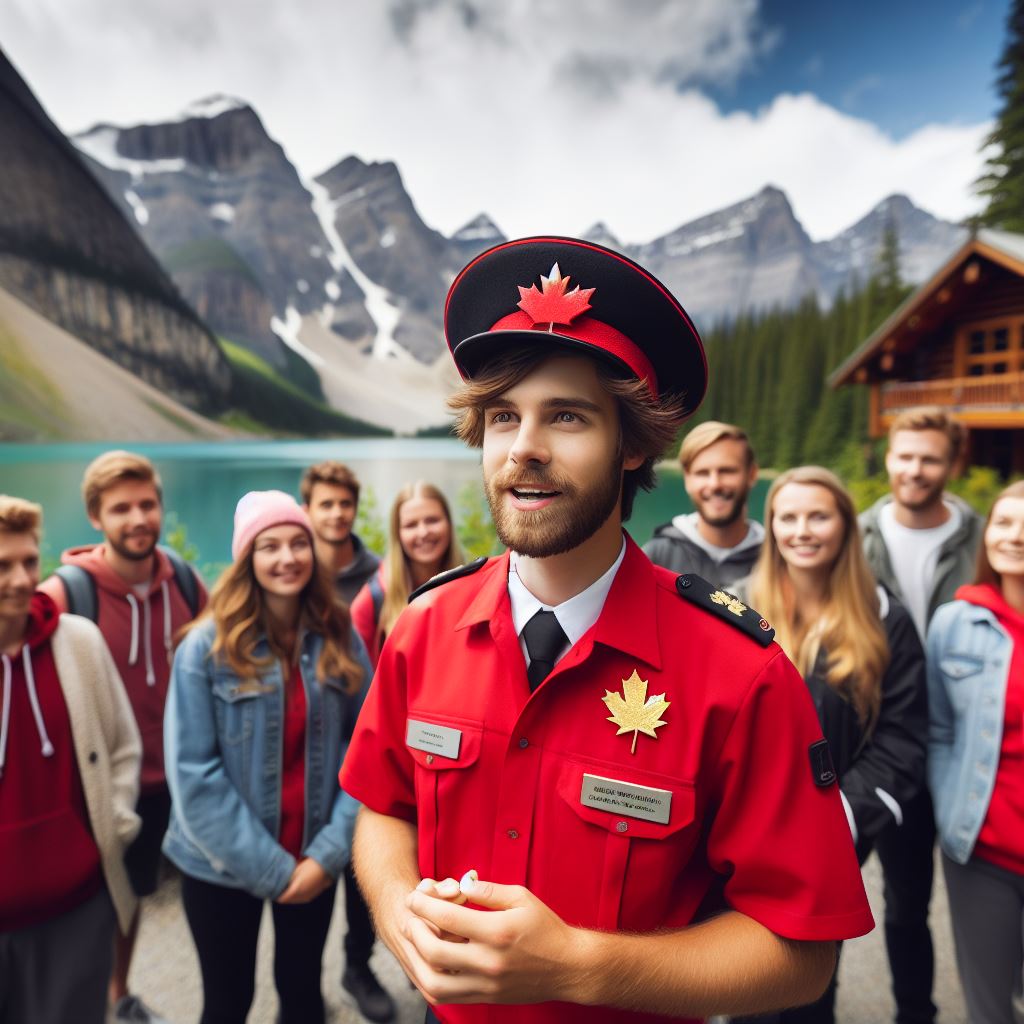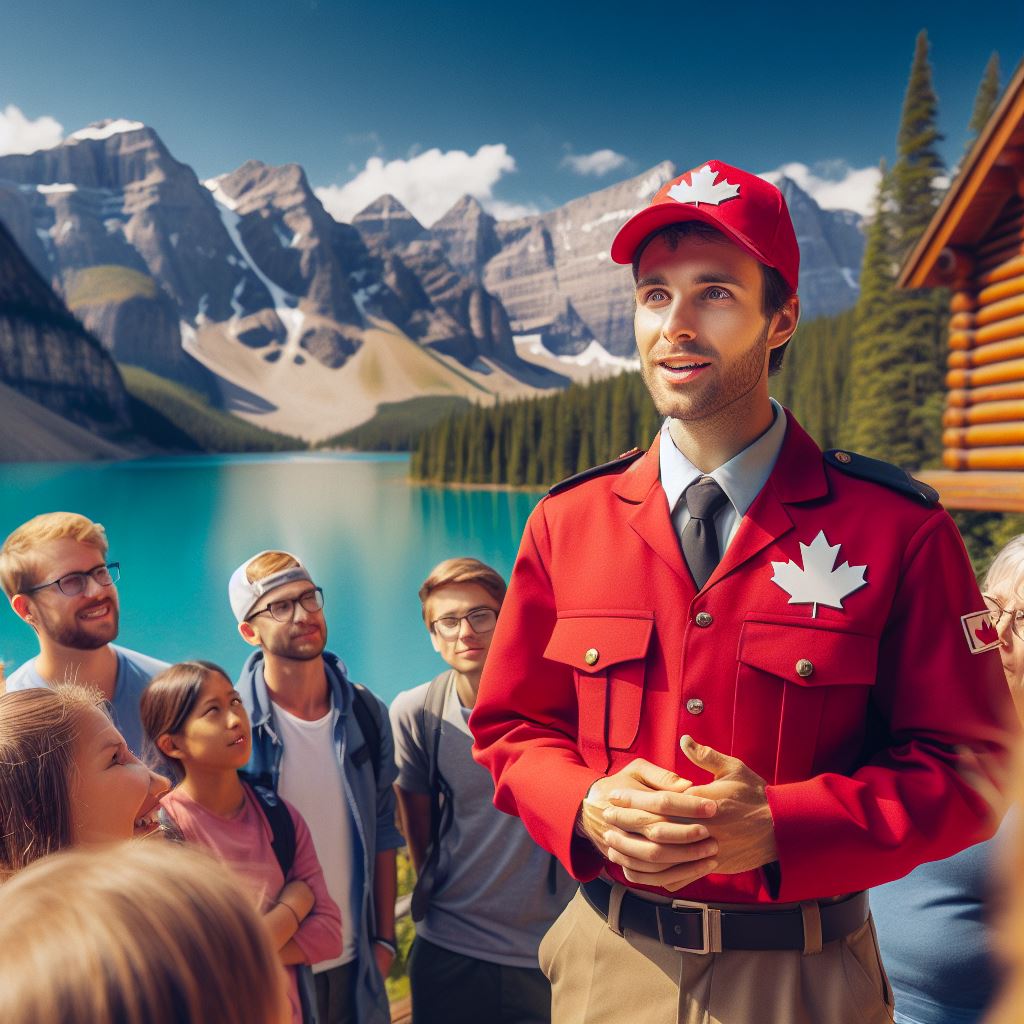Introduction
Being a Canadian tour guide is a rewarding and exciting profession that allows individuals to showcase the beauty and diversity of Canada to visitors from around the world.
Brief explanation of the role of a Canadian tour guide
A Canadian tour guide is responsible for providing informative and engaging tours to tourists, highlighting the history, culture, and natural wonders of Canada.
They act as ambassadors, ensuring visitors have a memorable experience.
Importance of having the necessary skills for the job
Active Voice:
Canadian tour guides need essential skills to deliver exceptional tours, creating unforgettable memories for tourists.
Firstly, effective communication skills are crucial for clearly conveying information and engaging with tourists of diverse backgrounds.
Secondly, extensive knowledge of Canada’s history, geography, and cultural landmarks enables tour guides to offer informative and educational experiences.
Excellent organizational skills empower tour guides to efficiently plan and manage enjoyable, seamless tours for tourists.
In addition, adaptability and problem-solving skills are vital for handling unexpected situations that may arise during tours, such as weather changes or unforeseen circumstances.
Furthermore, interpersonal skills are essential for building rapport with tourists and creating a comfortable and welcoming atmosphere.
Finally, a strong sense of leadership and the ability to handle large groups ensure that tours are well-organized and participants remain engaged and entertained.
Basically, being a Canadian tour guide requires a diverse range of skills, including effective communication, extensive knowledge, organisational abilities, adaptability, interpersonal skills, and leadership qualities.
These skills are fundamental for providing exceptional tours that leave a lasting impression on visitors to Canada.
Knowledge of Canadian History and Culture
In order to be an effective tour guide in Canada, it is essential to possess a deep knowledge of Canadian history and culture.
Understanding the country’s rich history and cultural heritage allows tour guides to provide accurate and interesting information about various attractions.
One of the key skills needed by Canadian tour guides is the ability to provide accurate and interesting information about various attractions.
This requires thorough research and a commitment to staying up-to-date with the latest information on each attraction.
By doing so, tour guides can offer visitors a comprehensive and engaging experience.
Another important skill for Canadian tour guides is the ability to interpret and explain the significance of historical and cultural sites.
Being well-versed in Canadian history allows tour guides to provide visitors with a deeper understanding and appreciation of the attractions they are visiting.
This includes knowledge of important events, key figures, and cultural traditions.
It is also crucial for tour guides to understand the importance of continuously updating their knowledge.
Canada is a country that is constantly evolving, with new discoveries and developments in its history and culture.
By staying informed and keeping their knowledge current, tour guides can provide visitors with the most accurate and relevant information available.
Overall, the top skills that every Canadian tour guide needs include:
- A strong knowledge of Canadian history and culture
- An understanding of the country’s rich history and cultural heritage
- The ability to provide accurate and interesting information about various attractions
- The importance of continuously updating knowledge
Importance of continuously updating knowledge
By possessing these skills, tour guides can ensure that visitors have a memorable and informative experience while exploring Canada’s diverse attractions.
Whether it’s visiting iconic landmarks like the CN Tower in Toronto or exploring the historic sites in Quebec City, knowledgeable tour guides play a crucial role in enhancing the overall tourism experience.
In essence, being a Canadian tour guide requires more than just providing directions and general information.
It demands a deep understanding of Canadian history and culture and the ability to share that knowledge with visitors in a captivating and informative manner.
By continuously updating their knowledge and being passionate about sharing Canada’s rich heritage, tour guides can provide visitors with a truly immersive and educational travel experience.
Fluency in Multiple Languages
Being fluent in multiple languages is a crucial skill that every Canadian tour guide needs.
It offers several advantages when it comes to communicating with tourists from different countries.
The Advantage of Being Able to Communicate with Tourists from Different Countries
- When a tour guide is fluent in multiple languages, they can effectively communicate with tourists from different countries.
- Language barriers can be a major obstacle when it comes to providing a satisfactory tour experience.
- By being able to communicate in their native language, tour guides can ensure visitors feel more comfortable and informed.
- It also helps in understanding visitors’ needs, preferences, and any specific requirements they might have.
Popular Languages Spoken by Tourists Visiting Canada
- English is the most widely spoken language in Canada, making it essential for tour guides to be fluent in it.
- French is another important language due to Canada’s strong French-speaking population, especially in Quebec.
- Other popular languages spoken by tourists include Spanish, Mandarin, German, Japanese, and Italian.
Benefits of Language Proficiency in Establishing Rapport with Visitors
- When a tour guide can speak a visitor’s native language, it helps in establishing a personal connection.
- Visitors feel more at ease and are more likely to engage in conversations and ask questions.
- Language proficiency also aids in conveying information with accuracy and clarity, avoiding misunderstandings.
- It showcases the tour guide’s professionalism and dedication to providing a top-notch experience.
There are numerous benefits to being fluent in multiple languages as a Canadian tour guide.
It opens up opportunities to connect with visitors from various countries, ensuring a memorable and personalized experience for everyone involved.
Being able to communicate in popular languages spoken by tourists in Canada, such as English, French, Spanish, Mandarin, German, Japanese, and Italian, allows tour guides to cater to a wide range of visitors.
This proficiency in multiple languages greatly aids in establishing rapport with visitors.
It builds trust, encourages interactions, and facilitates seamless communication.
Overall, fluency in multiple languages is a skill that amplifies the effectiveness and success of Canadian tour guides.
It enhances the overall tour experience, promotes cultural exchange, and leaves a lasting impression on visitors.
Through language proficiency, tour guides can bridge gaps, break down barriers, and create unforgettable memories for tourists exploring the beautiful landscapes and diverse attractions of Canada.
Read: Event Planning Ethics: A Canadian Perspective
Excellent Communication and Interpersonal Skills
Effective communication is crucial in conveying information to tourists.
As a Canadian tour guide, it is essential to have excellent communication skills to ensure that tourists understand and enjoy their experience.
Active listening skills play a significant role in better understanding tourists’ needs and preferences.
By actively listening, tour guides can tailor their information and itinerary to meet the interests of the group.
Handling difficult situations with calmness and professionalism is another skill that every Canadian tour guide needs to possess.
It is inevitable to encounter challenging situations during tours, such as unhappy tourists or unexpected disruptions.
Being able to handle these situations calmly and professionally is key to ensuring a positive experience for everyone involved.
Importance of Effective Communication in Conveying Information to Tourists
Effective communication is the foundation of a successful tour.
Tourists rely on tour guides to provide them with accurate and engaging information about the destinations they visit.
Without effective communication skills, this exchange of information may suffer, leading to dissatisfied tourists.
Unlock Your Career Potential
Visualize a clear path to success with our tailored Career Consulting service. Personalized insights in just 1-3 days.
Get StartedClear and concise communication allows tourists to fully understand the history, culture, and significance of the places they are visiting.
Tour guides must be able to convey complex information in a way that is accessible and interesting to a wide range of individuals.
Moreover, effective communication helps to build rapport and connection with tourists.
When tour guides can establish a connection with their audience, tourists are more likely to be actively engaged in the experience and feel valued.
Active Listening Skills to Better Understand Tourists’ Needs and Preferences
Active listening involves fully concentrating on what the tourists are saying and responding in a way that shows understanding and empathy.
By actively listening, tour guides can get a deeper understanding of tourists’ needs, preferences, and expectations.
Active listening also allows tour guides to address any concerns or issues that tourists may have during the tour promptly.
By being attentive, tour guides can provide the necessary support and make appropriate adjustments to ensure a positive experience for everyone.
Additionally, active listening helps tour guides identify opportunities to personalize the tour experience.
By understanding tourists’ interests, tour guides can tailor the information and itinerary to provide a more unique and memorable experience.
Ability to Handle and Diffuse Difficult Situations with Calmness and Professionalism
Difficult situations can arise during tours, such as conflicts between tourists, unexpected weather conditions, or sudden changes in the itinerary.
In such situations, it is essential for Canadian tour guides to remain calm and professional.
Remaining calm allows tour guides to think rationally and find the most appropriate solution to the problem at hand.
By maintaining professionalism, tour guides can handle difficult situations without escalating tensions or negatively affecting the overall tour experience.
It is also important for tour guides to empathize with tourists and address their concerns with understanding.
By showing empathy, tour guides can help diffuse tension and make tourists feel supported and valued.
In fact, excellent communication and interpersonal skills are essential for Canadian tour guides.
By having effective communication skills, active listening abilities, and the ability to handle difficult situations with calmness and professionalism, tour guides can ensure a memorable and enjoyable experience for their tourists.
Read: How to Impress Clients in Canadian Event Planning

Superb Organizational and Time Management Skills
When it comes to being a successful Canadian tour guide, having superb organizational and time management skills is an absolute must.
These key skills are crucial for planning and executing smoothly organized tours.
Key skills for planning and executing smoothly organized tours:
- Ability to handle logistics such as transportation, accommodation, and itinerary. This involves careful planning and coordination to ensure everything runs smoothly throughout the tour.
- Effective communication skills to maintain clear and consistent communication with tour participants, fellow guides, and service providers.
- Being able to multitask and prioritize tasks to ensure all aspects of the tour are well-managed and addressed in a timely manner.
- Attention to detail is imperative to ensure nothing is overlooked, bookings are accurate, and all necessary arrangements are made.
- Problem-solving skills are essential for handling unexpected situations or challenges that may arise during the tour.
- Flexibility and adaptability to adjust plans as necessary to cater to the needs and preferences of the tour participants or to accommodate changes in schedules or circumstances.
- Excellent time management skills to stick to the tour itinerary, meet deadlines, and ensure punctuality for all activities and transportation arrangements.
- Resourcefulness and ability to think on their feet to find alternative solutions or options when faced with unforeseen circumstances.
- Strong organizational skills to effectively manage documents, paperwork, bookings, and financial transactions associated with the tour.
- Attention to customer satisfaction and providing exceptional customer service throughout the tour experience.
By possessing these key skills, Canadian tour guides can ensure the success of their tours and provide an enjoyable and memorable experience for their clients.
Read: Networking Tips for Event Planners in Canada
Problem-Solving and Decision-Making Abilities
Tour guides in Canada need to possess strong problem-solving and decision-making abilities to efficiently handle unexpected challenges and ensure the best experience for tourists.
This crucial skill set helps them navigate various situations and provide effective solutions on the go.
Need for Quick Thinking and Adaptability when Faced with Unexpected Challenges
Tour guiding is an ever-changing profession where unexpected challenges can arise at any moment.
Tour guides must possess the ability to think quickly and adapt to new circumstances on the spot.
Whether it’s a sudden change in the weather, a transportation issue, or a tourist’s special request, tour guides should be able to problem-solve efficiently and make prompt decisions to maintain a seamless experience for all.
Ability to Make Informed Decisions to Ensure the Best Experience for Tourists
Tour guides hold the responsibility of creating unforgettable experiences for tourists visiting Canada.
Making informed decisions based on their extensive knowledge and expertise is essential.
They must consider factors such as time constraints, tourist preferences, safety regulations, and cultural sensitivities to ensure the best possible outcomes.
It requires careful analysis, critical thinking, and the ability to weigh different options before arriving at a well-informed decision.
Examples of Typical Issues Tour Guides Might Encounter and How to Address Them
- Language barriers: When faced with tourists who don’t speak the local language, a tour guide can use visual aids, gestures, or even hire an interpreter if necessary.
- Unforeseen weather changes: If the weather suddenly turns unfavorable for a planned outdoor activity, the tour guide can have alternative indoor options prepared in advance.
- Unplanned tourist requests: Tourists may occasionally have unexpected requests, such as changing the itinerary or asking for extra stops. A tour guide should calmly assess the situation, communicate with the group, and accommodate the request if feasible without compromising other aspects of the tour.
- Logistics issues: Transportation breakdowns or delays can disrupt the tour schedule. A quick-thinking tour guide should have backup plans, such as alternative transportation options or alternative activities nearby, to minimize the impact on the overall experience.
- Health and safety concerns: If a tourist falls ill or encounters a medical emergency, the tour guide should be prepared to handle the situation by promptly contacting emergency services, providing necessary first aid, and ensuring the tourist’s comfort and well-being.
In short, the role of a tour guide in Canada requires problem-solving and decision-making abilities to handle unexpected challenges effectively.
A tour guide’s quick thinking, adaptability, and informed decision-making ensure that tourists have the best possible experience during their visit.
By addressing typical issues such as language barriers, weather changes, unplanned requests, logistics issues, and health concerns, tour guides can ensure a memorable and hassle-free journey for all.
Read: Building a Portfolio as a Canadian Event Planner
Leadership and Teamwork Skills
Leading a group of tourists and managing their expectations
As a Canadian tour guide, strong leadership and teamwork skills are essential to ensuring a successful and enjoyable experience for both you and your travelers.
Leading a group of tourists involves much more than just showing them around; it requires effective communication, organization, and the ability to manage their expectations.
One of the key aspects of being a tour guide is leading a group of tourists and managing their expectations.
This involves providing clear instructions, guiding the group safely and efficiently, and addressing any concerns or questions that may arise.
By effectively leading the group, you create a sense of trust and confidence among the travelers, enhancing their overall experience.
Collaborating with other tourism professionals, such as drivers or local guides
In addition to leading the group, collaborating with other tourism professionals is also crucial.
You may work closely with drivers, local guides, or even hotel staff to ensure a seamless travel experience.
By maintaining open lines of communication and working together as a team, you enhance the quality of service provided to your tourists, making their journey even more memorable.
Promoting a positive team atmosphere and fostering a sense of belonging
A positive team atmosphere is important not only among fellow tourism professionals but also within your own group of tourists.
Promoting a sense of belonging and camaraderie ensures that everyone feels comfortable and enjoys their time together.
This can be achieved through team-building activities, encouraging group discussions, and creating opportunities for interaction among the travelers.
By fostering a positive team atmosphere, you not only enhance the overall experience for your tourists but also establish yourself as a leader who values the importance of teamwork.
This can lead to increased satisfaction and recommendations from your travelers, boosting your reputation as a Canadian tour guide.
In review, as a Canadian tour guide, mastering leadership and teamwork skills is vital to your success.
Leading a group of tourists, collaborating with other tourism professionals, and promoting a positive team atmosphere are all essential in creating an unforgettable and enjoyable experience for both you and your travelers.
So sharpen these skills, embrace the opportunities, and embark on a fulfilling journey as a Canadian tour guide.
Flexibility and Resilience
In order to excel as a tour guide in Canada, flexibility and resilience are essential qualities.
The nature of the job often requires adapting to unpredictable circumstances, and being prepared for unexpected changes in weather, transportation, or attractions.
Additionally, tour guides must be able to cope with demanding schedules while maintaining a positive attitude.
Recognizing the unpredictable nature of the job and the need to adapt
- As a tour guide, it is crucial to understand that unexpected situations can arise at any moment.
- Being able to anticipate and adapt to these changes is key to providing a seamless experience for your clients.
- Whether it’s a sudden closure of an attraction or a last-minute change in itinerary, a flexible mindset is invaluable.
- By staying calm and composed, you can quickly come up with alternative plans and ensure the tour continues smoothly.
Handling unexpected changes in weather, transportation, or attractions
- Weather conditions in Canada can be unpredictable, with sudden rain showers, snowstorms, or extreme temperatures.
- A tour guide must be prepared for these shifts and have contingency plans in place.
- Having backup indoor attractions or alternate routes can make a significant difference in the overall experience.
- Similarly, transportation issues such as delays or cancellations can disrupt the tour schedule.
- Being resourceful and having good communication with transportation providers can help solve these challenges efficiently.
- It is essential to keep clients informed and find suitable alternatives to ensure their satisfaction.
Coping with demanding schedules and maintaining a positive attitude
- Tour guiding often involves long hours, multiple stops, and tight deadlines.
- Maintaining a positive attitude throughout these demanding schedules is crucial for both the guide and the clients.
- By approaching each tour with enthusiasm and energy, you can create a favorable atmosphere for everyone involved.
- Managing your time efficiently and prioritizing tasks can help alleviate stress and prevent burnout.
- Remember that as a tour guide, you are responsible for creating unforgettable experiences for your clients.
- Having resilience and embracing challenges as opportunities for growth will not only enhance your performance but also leave a lasting impression on your guests.
Flexibility and resilience are indispensable skills for any Canadian tour guide.
Embracing the unpredictable nature of the job, handling unexpected changes gracefully, and maintaining a positive attitude are qualities that set exceptional guides apart from the rest.
By honing these skills, you can provide memorable experiences for your clients and ensure the success of every tour.
Conclusion
Canadian tour guides need to possess a wide range of skills to excel in their profession.
The top skills include strong communication abilities, excellent storytelling techniques, cultural knowledge, flexibility, and problem-solving capabilities.
To be successful in this field, continuous learning and self-improvement are essential.
Tour guides must stay updated with the latest information, trends, and technologies in the tourism industry.
This will enable them to provide the best experience for their clients and adapt to the ever-changing landscape of the Canadian tourism market.
Aspiring tour guides should be inspired to develop these skills by understanding the significance they hold in their careers.
A combination of hard skills and personal attributes is necessary to stand out in this competitive industry and deliver exceptional service to tourists.
By continuously honing their skills, aspiring tour guides can enhance their knowledge, gain insights into different cultures, and become adept at handling diverse audiences.
This will pave the way for a successful and rewarding career in the Canadian tourism sector.
Remember, being a tour guide is more than just showcasing attractions.
It is about creating memorable experiences and connecting with travelers from all around the world.
With the right skills and a passion for travel, anyone can embark on this exciting path and contribute to Canada’s vibrant tourism industry.




